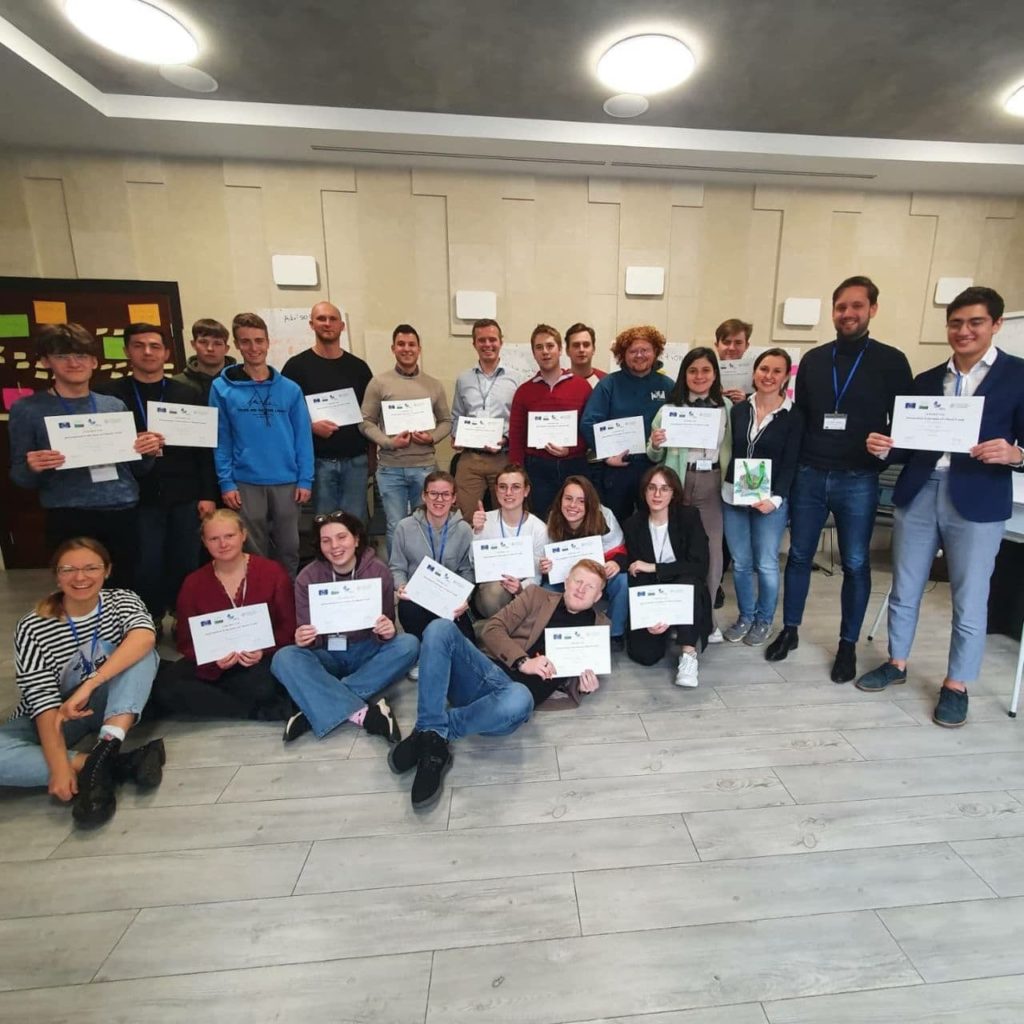Lviv, October 2021

The last event of the work plan was the international seminar that was attended by participants from different European countries: Albania, Austria, Belarus, Germany, the Netherlands, Turkey, and Ukraine. The seminar took place in Taurus City Hotel, Lviv, a comfortable hotel that had all the necessary facilities to ensure a smooth event. The event lasted as planned for four days, out of which two were full and two half days. The event had quite a high-intensity schedule, consisting of a diversity of sessions to achieve the objectives as stated in the application. A crucial point of the seminar was to explore the nature of the leadership of participants and based on their preferred roles to find ways how to use tools of youth participation on a local level, be vocal on local issues and bring up these topics in campaigns and deliver these messages to the local authorities. Rather than a theoretical perspective, the seminar explored the topic from a more personal angle – both trainers and some participants have already experienced the election process and identified challenges and obstacles for youth. When discussing these points in groups and with trainers, participants got answers and suggestions on the potential scenarios in described cases, therefore the engagement during the seminar also had extreme practical value.
The activity included highly interactive workshops, BootCamp sessions as well as Open Space On Speed sessions where participants had an opportunity to share best practices from their leadership experience and ways to develop other beneficial local leadership skills. The seminar also featured an expert session with three local experts allowing the participants to get a better understanding of how Ukrainian civil society gained a new wave of development after the Revolution of dignity in 2014 and how youth was engaged in the Parliamentary elections in 2019 and local elections in 2020. The global perspective of the local leadership was delivered through the hybrid session with experts from Lebanon, Germany, and the Netherlands. Therefore, the whole pool of experts gave a perspective on leadership and the beginning of a political career in diverse political backgrounds.
The practical knowledge on public speaking, campaigning, effective leadership skills, and a lot of discussion between participants has led to a liberal hackathon where the main goal was the creation of the local leader toolkit, which also included gained knowledge from the previous Working Plan Event in Istanbul, Berlin, and Lisbon.
Preparations of this seminar started in August by Selecting the team members, especially successfully finding a local council member who is willing to commit to being part of the team. The full team had their first formal meeting on the 15 of September where they were briefed on the concept of the work plan and this seminar in specific. Several preparatory meetings have taken place since then until the team finally met on the ground one day before the seminar.
The seminar started in the afternoon of Thursday, 14.10.2021. With an introduction session on the seminar and the WorkPlan, participants were also introduced to the Partners in this seminar, which are the council of Europe, the European Youth Foundation and the Center Party International Foundation of Sweden. Several team building activities took place that evening, Concluded with a Cultural Evening. Participants on the second day discussed what it means to be a leader for them. Which ignited discussions and different thoughts within the participants and was a segue into the skills bootcamp were skills.such as Campaigning and Public Speaking, were introduced and discussed with the participants.
Participants were then able to reflect on these skills and their applications with local and international experts on the morning of the third day. Afterwards, participants resumed the bootcamp and also contributed actively through the “Open Space on Speed” session with skills, ideas and briefings to the content of the seminar.
The team finally debriefed on the 18th of October discussing the results of the seminar, and the potential next steps.
The international seminar in Lviv, Ukraine was the final event of the 2021 Work Plan. The first seminar was held in Istanbul, Turkey, and was aimed at getting your message across and vocalizing topics relevant to the needs of youth. As the outcome of the first seminar, the first part of the starter kit on different fields of youth leadership was developed: participants were divided into three groups and found out answers to the following questions: 1. “How to connect with your community/engage with the public?” (including the skills discussed or observed during the seminar, such as messaging, communicating through social media, etc). 2. “ How to transfer experiences from other contexts to local reality?” and 3. `How to reflect the liberal values that IFLRY stands for into civic activism`.
The second event in Berlin included practical part of the leadership and participants observed a protest in front of the Chinese Embassy against the PRC’s repressions of dissidents in Hong Kong and Tibet, and the genocide currently going on in or East Turkestan and studied the campaign of a Bundestag candidate`s constituency on the outskirts of Berlin. These practical cases made participants reflect on the “Leadership skills you need to have (including direct tips)`, “the power of the international network, why young political leaders have to gather and learn from each other, and how to adapt to the local context” complementing the work of the group in Istanbul on this vital topic for internationally engaged political leaders and activists as well as the political campaigning based on the example of German elections.
The participants of the Lisbon event developed an avatar of the ideal political education which will then be used in our final video project on “Leadership Doesn’t Mean Alpha” and discovered the skills of a political facilitator and political event management skills.
Every seminar started with a brief description of conclusions from previous events in the 2021 Work Plan and was incorporated in the introductory sessions defining the skills and traits of an ideal leader, where information was presented by team members or IFLRY Bureau Representatives. This ensured a smooth connection between all Work Plan events and restating of the main topic `You(th) redefining political leadership`. Furthermore, the final activity in Lviv was attended by several participants who also attended the event in Istanbul, to ensure that the learnings are transferred and deepened. The Lviv seminar on local leadership empowered participants with the information about fundamental tools of youth representation as well as analysis of practical cases of local leadership from countries of participants` origin (Albania, Austria, Belarus, Germany, the Netherlands, Turkey, and Ukraine) gave a comprehensive view on local leadership that participants later expressed in the the “Local Leadership: Starter Kit.”, consisting from 4 parts: project management (including life-hacks of political facilitating discussed within the third Work Plan event in Lisbon), campaigning (complementing the work of the group in Berlin), opponent research and short-term planning. There has been a lot of space to transfer the newly gained knowledge, motivation, and inspiration into follow-up measures that can be implemented almost instantly after their return to their home countries, thus fulfilling the overall objectives of the work plan as indicated in the application.
The team was formed from the IFLRY Pool of Trainers – the IFLRY programme which advocates and implements Non-Formal Education – and one external expert. The Team was led by the IFLRY Pool of Trainers co-programme manager May El Masri (Course Director) of Lebanese origin, residing in Beirut. The other team members included Katharina Schreiner, the former International Officer for our German Member organization and German Bundestag candidate (2017) as well as engaged in political youth work on an international and local level for several years and Yevheniia Fedotova, Vice-President of IFLRY, originally from Ukraine, responsible for communications of the federation. The external expert Jan Willem de Bruin, who is a current member of the city council for the Centre of Rotterdam for D66 (Social Liberal Party in the Netherlands), joined as a respective team member. Logistics and administrative support were taken care of by IFLRY’s Executive Director Hussam Erhayel. The team included trainers with the practical experience of being elected local candidates and experience in the Eastern European post-Soviet political situation.
The preparation and delivery of the event were led by the Course Director, working in close cooperation with the other team members, the Office, and the corresponding Bureau members to ensure that both the flow and the administration of the event were aligned with the plans and where needed be responsive to the developing situation in the region and the world. Also, the Team took into consideration that the event in Lviv was the final one and needed to include a significant reflection process. The Team was all involved in the preparation process through online information-sharing platforms. All the Team wasn’t present at all stages of the seminar itself due to the visa issues faced by the Course Director. The final evaluation meetings were therefore held via Zoom rather than in-person.
The process of selecting participants was conducted through an open call application system, based on experience in the local leadership, as well as expressed interest and willingness to use the seminar outcomes in their future youth work. Therefore, many participants came from civil society and political parties, with experience in campaigning and participation in real elections or other backgrounds. Some of the participants also participated in the previous Working Plan Events in 2021. However, participants with less experience were welcomed and it gave an opportunity for them to explore different approaches and models of local leadership across Europe. The activity for most participants was their first international experience, their first introduction to the topic, to IFLRY, to Council of Europe, EYF as well as their first acquaintance with the non-formal education methodology. This empowered participants to become more active on the topic and to share their experience with their local communities as well as implement newly gained practices.
